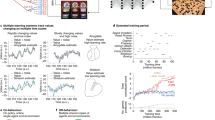Abstract
Natural systems such as plants, animals and humans exhibit behaviour that forms distinct, rhythmic cycles. These cycles permit individuals and societies to learn, adapt and evolve in complex, dynamic environments. This paper introduces a model of behaviour cycles for artificial systems. This model provides a new way to conceptualise and evaluate life-long learning in artificial agents. The model is demonstrated for evaluating the sensitivity of motivated reinforcement learning agents. Results show that motivated reinforcement learning agents can learn behaviour cycles that are relatively robust to changes in motivation parameters.
Preview
Unable to display preview. Download preview PDF.
Similar content being viewed by others
References
Ahlgren, A., Halberg, F.: Cycles of nature: an introduction to biological rhythms. National Teachers Association, Washington (1990)
Bondu, A., Lemaire, V.: Active learning using adaptive curiosity. In: Proceedings of the Seventh International Conference on Epigenetic Robotics, Lund University (2007)
Brown, F.A.: Persistent activity rhythms in the oyster. American Journal of Physiology 178(33), 510–514 (1954)
Chavanne, T.: Variation in risk taking behaviour among female college students as a function of the menstrual cycle. Evolution and Human Behaviour 19(1), 27–32 (2003)
Dunlap, J., Loros, J., De Coursey, P.: Chronobiology: biological timekeeping. Sinauer Associates (2003)
Ehrlich, P., Raven, P.: Butterflies and plants: a study in co-evolution. Evolution 18, 584–608 (1964)
Green, R.G., Beatty, W.W., Arkin, R.M.: Human motivation: physiological, behavioural and social approaches. Allyn and Bacon, Inc., Massachussets (1984)
Kolb, D.A., Rubin, I.M., McIntyre, J.M. (eds.): Organizational Psychology: Readings on Human Behaviour in Organizations. Prentice-Hall, Englewood Cliffs (1984)
Laird, J., van Lent, M.: Interactive computer games: human-level AI’s killer application. In: National Conference on Artificial Intelligence (AAAI), pp. 1171–1178 (2000)
Macindoe, O., Maher, M.L., Merrick, K.: Agent based intrinsically motivated intelligent environments, Handbook on Mobile and Ubiquitous Computing: Innovations and Perspectives. American Scientific Publishers (2008)
Mac Namee, B., Dobbyn, S., Cunningham, P., O’Sulivan, C.: Simulating virtual humans across diverse situations. In: Rist, T., Aylett, R.S., Ballin, D., Rickel, J. (eds.) IVA 2003. LNCS, vol. 2792, pp. 159–163. Springer, Heidelberg (2003)
Merrick, K.: Modelling motivation for adaptive non-player characters in dynamic computer game worlds. ACM Computers in Entertainment 5(4) (2007)
Merrick, K., Maher, M.L.: Motivated reinforcement learning for non-player characters in persistent computer game worlds. In: ACM SIGCHI International Conference on Advances in Computer Entertainment Technology, Los Angeles, USA (2006)
Merrick, K., Maher, M.L.: Motivated reinforcement learning for adaptive characters in open-ended simulation games. In: ACM SIGCHI International Conference on Advances in Computer Entertainment Technology, Salzburg, Austria, pp. 127–134 (2007)
Nefedov, S.A.: A Model of Demographic Cycles in Traditional Societies: The Case of Ancient China. Evolution and History 3(1), 69–80 (2004)
Nilsson, N.: Introduction to machine learning (accessed January 2006), http://ai.stanford.edu/people/nilsson/mlbook.html
Oudeyer, P.Y., Kaplan, F., Hafner, V.: Intrinsic motivation systems for autonomous mental development. IEEE Transactions on Evolutionary Computation 11(2), 265–286 (2007)
Singh, S., Barto, A.G., Chentanex, N.: Intrinsically motivated reinforcement learning. In: Advances in Neural Information Processing Systems 17 (NIPS), pp. 1281–1288 (2005)
Stoytchev, S.: Five basic principles of developmental robotics. In: NIPS Workshop on Grounding, Perception, Knowledge, and Cognition (2006)
Thrun, S., Mitchell, T.: Lifelong robot learning. Robotics and Autonomous Systems (1993)
Usher, D.: The dynastic cycle and the stationary state. The American Economic Review 79, 1031–1044 (1989)
Wever, R.: Human circadian rhythms under the influence of weak electric fields and the different aspects of these studies. Intn’l Journal of Biometeorology 17(3), 227–232 (1973)
Winberg, S., Balkenius, C.: Generalization and specialization in reinforcement learning. In: Proceedings of the 7th Itn’l Conference on Epigenetic Robotics, Lund University (2007)
Zimecki, M.: The lunar cycle: effects on human and animal behaviour and physiology. Postepy Hig. Med. Dosw. 60, 1–7 (2006)
Author information
Authors and Affiliations
Editor information
Editors and Affiliations
Rights and permissions
Copyright information
© 2008 Springer-Verlag Berlin Heidelberg
About this paper
Cite this paper
Merrick, K. (2008). Modelling Behaviour Cycles for Life-Long Learning in Motivated Agents. In: Li, X., et al. Simulated Evolution and Learning. SEAL 2008. Lecture Notes in Computer Science, vol 5361. Springer, Berlin, Heidelberg. https://doi.org/10.1007/978-3-540-89694-4_1
Download citation
DOI: https://doi.org/10.1007/978-3-540-89694-4_1
Publisher Name: Springer, Berlin, Heidelberg
Print ISBN: 978-3-540-89693-7
Online ISBN: 978-3-540-89694-4
eBook Packages: Computer ScienceComputer Science (R0)




